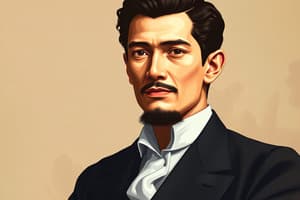Podcast
Questions and Answers
What were the grounds for Rizal's arrest according to the GRACETA DE MANILA?
What were the grounds for Rizal's arrest according to the GRACETA DE MANILA?
- His promotion of Filipino nationalism and independence
- His criticism of the Spanish colonial administration
- His anti-Catholic and anti-friar stance manifested in his writings (correct)
- His involvement in revolutionary activities against the Spanish government
What did Rizal use a portion of his lottery winnings for?
What did Rizal use a portion of his lottery winnings for?
- To purchase a house in Manila
- To purchase land in Talisay, near Dapitan (correct)
- To support the revolutionary movement against Spain
- To fund the publication of his novels
Which of the following family members did NOT visit Rizal during his exile in Dapitan?
Which of the following family members did NOT visit Rizal during his exile in Dapitan?
- His mother
- His brother Paciano (correct)
- His sister Narcissa
- His sister Trinidad
What did Rizal build in Talisay during his exile?
What did Rizal build in Talisay during his exile?
What was Rizal's profession during his exile in Dapitan?
What was Rizal's profession during his exile in Dapitan?
Which of the following was NOT one of Rizal's community projects in Dapitan?
Which of the following was NOT one of Rizal's community projects in Dapitan?
To whom did Rizal contribute his painting skills in Dapitan?
To whom did Rizal contribute his painting skills in Dapitan?
Which of the following was NOT one of Rizal's sculptural works during his exile in Dapitan?
Which of the following was NOT one of Rizal's sculptural works during his exile in Dapitan?
What scientific contribution did Rizal make during his exile in Dapitan?
What scientific contribution did Rizal make during his exile in Dapitan?
To whom did Rizal give the bust of St. Paul that he sculpted in Dapitan?
To whom did Rizal give the bust of St. Paul that he sculpted in Dapitan?
Flashcards are hidden until you start studying
Study Notes
Philippine History and Jose Rizal's Life
- In the mid-1830s, the Philippines was open to foreign merchants almost without restriction.
- In 1863, the public education curriculum was controlled by the Church.
- In the 1880s, sons of wealthy families were sent to Europe to study.
- In 1892, Jose Rizal returned to the Philippines from the La Liga Filipina.
- In 1896, Jose Rizal was executed.
Jose Rizal's Genealogy and Early Childhood
- Jose Rizal's full name is Dr. Jose Protacio Rizal Mercado y Alonzo Realonda.
- He was named Jose by his mother, who was a devotee of Christian St. Joseph.
- Protacio comes from the Christian calendar, considering the day of his birth.
- Rizal means "a field where a wheat, cut while still green, sprouts again" in Spanish.
- Mercado was adopted by Domingo Lamco, which means "market" in Spanish.
- Alonzo is an old surname of his mother, while Realonda was used by his mother's godmother based on the culture at that time.
Jose Rizal's Early Education and Life
- Jose Rizal was born on June 19, 1861, in Calamba, Laguna.
- He was baptized by Fr. Rev. Rufino Collantes in the Catholic Church in Calamba on June 22, 1861.
- His godfather was Father Pedro Casanas, a close friend of the Rizal family.
- He received excellent grades in all subjects and a gold medal at the end of the school year.
- In 1874-1875, Rizal's mother was released from prison during his 3rd year in Ateneo.
- He became an interno in Ateneo and was inspired by Fr. Francisco de Paula Sanchez to study harder and write poetry.
- He won five medals during his 4th year in Ateneo.
- He wrote his first poem, "Mi Primera Inspiration," during his days in Ateneo.
- At 16 years old, he experienced his first romance with Segunda Katigbak, a 14-year-old Batanguena from Lipa.
University of Sto. Tomas and Higher Education
- Jose Rizal's mother opposed his higher education, fearing that the Spanish authorities might cut off his head with additional knowledge.
- After a family council, Don Francisco's and Paciano's decision prevailed, and Rizal entered the University of Santo Tomas in 1877.
- He enrolled in the Philosophy and Letters course, following his father's preference and due to uncertainty about his career.
- He finished a surveying course in Ateneo and took a vocational course in UST, leading to the title "perito agrimensor" (expert surveyor) at the age of 17.
- He was granted the title on November 25, 1881.
Travels and Romances
- He met Norfenfals, a great novelist in Europe, and received his lost diamond stickpin.
- He traveled to Ulm, Stuttgart, Baden, and Rheinfall in Europe.
- He crossed the border to Schaffhausen, Switzerland, and stayed in Basel, Bern, and Lausanne.
- He celebrated his 26th birthday in Geneva, spending 15 days in the city.
- He parted ways with Viola in Geneva, and she returned to Barcelona, while he went to Italy.
Later Life and Exile
- He visited Turin, Milan, Venice, and Florence in Italy.
- He attended the Madrid Exposition, where Igorots were exhibited, and some died.
- He went to Hong Kong and was welcomed by his friend Jose Ma. Besa on October 18, 1891.
- He published 800 copies of the first edition of his second novel, El Filibusterismo, in Hong Kong.
Studying That Suits You
Use AI to generate personalized quizzes and flashcards to suit your learning preferences.




